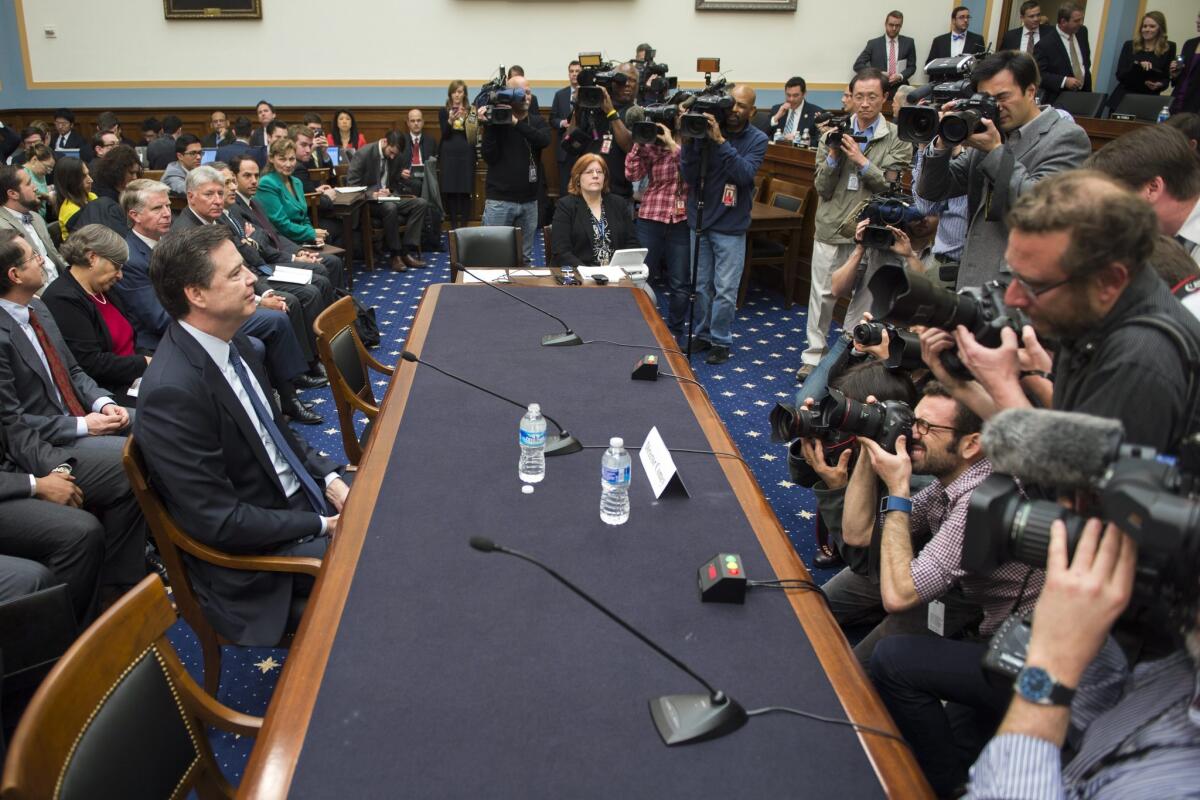Editorial: How a 1789 law impacts your iPhone

FBI Director James Comey prepares to testify at the House Judiciary Committee hearing on ‘The Encryption Tightrope: Balancing Americans’ Security and Privacy,’ on Capitol Hill on March 1.
- Share via
Should the courts order Apple to help the Federal Bureau of Investigation unlock an iPhone seized from a murderous terrorist or a dangerous criminal? For law enforcement officials across the country, this is a question of public safety, even of life and death. But according to a federal magistrate in Brooklyn, the real issue in such cases is how much power an 18th century law grants the federal government to force innocent parties to do its bidding. He was right about that, even though his ruling in a little-watched fight between Apple and the FBI could make it harder for investigators to uncover the clues that criminals and terrorists might hide in their encrypted devices.
The case before U.S. Magistrate Judge James Orenstein is far less exotic than the more celebrated one in Riverside, where Apple is resisting a court order to help the FBI decrypt an iPhone used by San Bernardino shooter Syed Rizwan Farook. The Brooklyn case involves an iPhone 5s that the Drug Enforcement Agency seized from a suspected drug dealer, Jun Feng. Although Feng has pleaded guilty, the feds contend that they could learn more about his suppliers and customers by searching the phone. Rather than trying to break into the locked phone through brute computer force, the Justice Department wants Apple to circumvent the passcode, as it has done roughly 70 times before.
But the magistrate balked, troubled by the way the Justice Department was trying to use the All Writs Act — a law that dates back to the very first Congress in 1789. The point of the statute is to give federal courts the power to carry out the orders they issue in situations where Congress hasn’t explicitly provided (or denied) that authority. For example, the All Writs Act has been used to compel phone companies to help law enforcement agents monitor the phone lines a court has authorized for surveillance.
Despite the statute’s broad reach, Orenstein ruled that All Writs couldn’t be used to force Apple to unlock a phone it had no connection to other than having built and sold it. On multiple occasions in the last two decades, Orenstein wrote, Congress has considered whether to require communications and technology companies to help federal agents gather evidence. And although lawmakers imposed such a duty on phone companies in a 1994 wiretap statute, they exempted companies that provide information services such as those Apple provides. To allow courts to create obligations after Congress has refused to do so, Orenstein ruled, would be a violation of the Constitution’s separation of judicial and legislative powers.
That argument relies to some degree on one’s reading of the 1994 act, which was adopted a decade before iPhones and other popular smartphones hit the market, and two decades before iPhones started automatically encrypting the data stored on them. Another plausible conclusion is that Congress didn’t contemplate in 1994 the effect that devices with automatic encryption would have on law enforcement, and since then lawmakers have found the issue too difficult to resolve. Either way, though, it’s clear that this issue involves a major question of public policy: how to balance the public’s interest in stopping crime and preventing terrorism against its need to protect sensitive data against cybercriminals and foreign hackers. That’s just the sort of question that Congress, not the courts, is supposed to answer.
Back in Riverside, the FBI is seeking to use All Writs to go one consequential step further. It’s trying to compel Apple to create a product — a new version of its iPhone operating system — that removes the security features that make its passcodes so hard to hack. That’s directly contrary to Apple’s commercial interests, in addition to being a potential threat to millions of innocent iPhone owners who have stored sensitive personal information on their devices.
If All Writs can be used to do that, it’s not clear what it cannot do. For example, Orenstein wondered, could a court force a pharmaceutical company whose executives object to capital punishment to supply lethal injection drugs? The government’s ability to enforce the law and protect the public is vital, but so too is the public’s ability to limit the power it grants the government through the legislative process. Orenstein’s ruling makes that point emphatically.
Follow the Opinion section on Twitter @latimesopinion and Facebook
More to Read
A cure for the common opinion
Get thought-provoking perspectives with our weekly newsletter.
You may occasionally receive promotional content from the Los Angeles Times.









